[Jimbaux is just giving you the same old story, same old song and dance . . . ]
Same Old, Same Old . . .
These pictures were taken Sunday 24 February 2008.
A photographer friend writes to me . . .
Ah, after a few years all your train photos look the same to me.
Yeah. Her “your train photos look the same to me” and that “no one is unique” comments reminds me of a woman whom I dated some years age who was less impressed about my railroad enthusiasm and photography once she learned that I’m not the only one who did it.
Anyway, my photographer friend writes additionally . . .
Your photos look the same to me now.. Because MY photos look the same, doesn’t mean I won’t shoot – but I think we naturally take the same kind of shots. Also you shoot the same places to get the “exact same shots” and I want mainly to get different shots, or unique ones (which doesn’t happen as much as I want)!
Well, I told her, I don’t always shoot the same places to get the “exact same shots,” and to whatever degree that I do, it’s because I’m already there. Also, though, please notice the lack of new material from me lately. It’s partly because I’m tired of doing it in the same places! That was a small part of why I left New Orleans in early 2011, because I had thought I had done all that I could in terms of railroad photography around here. Then, I returned in summer 2011, and I really appreciated the place again. A few months ago, I was telling a friend how I’ve now gotten over photographing trains around here again, and he said, “don’t move away again!”
All of my goals as far as places to photograph trains now are all distant (but not necessarily far away) from here, either places that I’ve never been or places that I’ve only given cursory visits. A bigger note to that is that I’m now starting to focus more on other things. Also, I apparently find it a better use of my time to process and post old pictures (usually, like “five years ago,” “three years ago,” and “one year ago”) than I do about getting out and shooting new pictures. Also, I’m still interested in watching trains and understanding their operations, but I’m less interested in photographing them, at least around here. I just like the knowledge and understanding of what’s happening. There have been a few times lately that I went out looking but didn’t take any pictures, mostly because I was in places where I’ve already done the best that I can photographically. What would get me to still photograph in those areas is some weird or elusive train or weird or elusive locomotive leading a train.
On That Happy Note . . .
. . . let’s look at some typical New Orleans railroad scenes from Jimbaux. You may not have seen these particular trains before, but these views are nothing new.
Get Yourself A Cooler, And Lay Yourself Low
We started the morning at Wisner Boulevard, but it was too cloudy to shoot the Crescent, and what’s all of this?
Anyway, as would normally happen around that time of morning, here came CSX’s morningly transfer job returning from CN Mays Yard. Job Y-305 is in charge of this train, and most of its traffic comes from the numerous chemical plants along the Mississippi River from New Orleans to Baton Rouge.
In case anyone is wondering, we’re on Norfolk Southern’s “Back Belt” terminal line across New Orleans, and you’re looking at City Park in New Orleans.
Well, that’s good, and let’s have a look in the other direction, showing the fog.
Yes, that is a BC Rail boxcar up front!
Okay, that’s good enough. Let’s get a few more shots of the runners in this race.
One more.
Okay, let’s go further east on the Back Belt. The NS transfer from the CN is now coming, right behind the CSX transfer that you just saw.
Yes, those are the Southern Railway cantilever signals. Here’s the view in the other direction past L&N Junction and the derelict tower.
You can barely see it in the above picture, but the switches that you see with the track going off to the left is the very southwestern corner of the vast CSX empire. The AN-41 was waiting on the yard job that you see above to clear.
Here’s a shot of Jimbaux taking the above shot.
Yeah, okay. Now, let’s get a closer look at the NS job, AN-41, with pipe that comes from a producer near Baton Rouge.
Much of this train’s traffic, too, comes from the chemical plants up the river toward and including Baton Rouge.
Here’s an overhead view of the Q601, which, as promised, shows a better view of L&N Junction (and the tower is just to the left of the left frame):
This view shows the southwestern corner of CSX’s vast empire. CSX train Q-601 is leaving CSX trackage at L&N Junction and moving onto the South Main of the Norfolk Southern Railway’s “Back Belt” line. The Q-601 is a run-through train to the Union Pacific at Avondale. Most of the traffic on this train will go to Englewood Yard, the UP’s ex-SP yard in Houston, Texas. This train originates in Waycross, Georgia. I-10 can be seen in the background.
Here, now, is an overhead view of the AN-41 as the Q601 is on its way.
Now, let’s check out the meet, as the AN-41 starts to move forward from a stop.
Now, here comes the ILBNO, a train that I miss, even though its successor the KLBNO is the same train with a different name. I just prefer the “I” prefix because it makes more sense.
How about the Popeye’s at left? It’s right by the track!
Typically, a fleet of eastbound and northbound trains get turned loose on the NS Back Belt after the 07:10 departure of Amtrak’s Crescent, and this morning was no exception. After waiting on the returning CSX and NS transfer runs, UP train ILBNO grinds to a halt at Frenchman Street as it waits for the AN-41 (that you just saw) to get out of the way. The ILBNO (Intermodal – Long Beach, Ca., to New Orleans, La.) was actually a run-trough intermodal train to the CSX, contrary to what its name suggests. The ILBNO, which carries international cargo, became CSX train Q192 to Atlanta, Georgia, and I think that it’s successor the KLBNO does too, after it makes a setout at UP’s Avondale Yard.
A “K” prefix in UP train nomenclature signifies a higher priority train. So, although I don’t know why UP changed the name of the train (you can’t make up reasons if you don’t have one, and you have to sometimes accept that you don’t know why something happens or happened), it does allow the railroad to tell the customers that their cargo is moving in a higher priority train.
It seemed like it was time to call it a morning, but we do have a fourth – and, thankfully, final – eastbound train on our hands.
UP train QLINSB on NS trackage crosses Bayou St. John in New Orleans. The QLINSB is a run-through train originating at the UP’s hump yard at Livonia, Louisiana. It terminates on the Norfolk Southern in New Orleans, but a large block of it goes northbound to Birmingham, Alabama, (hence the “B” at the end of the train’s name) on NS train 314.
Hey, look, we have a Conrail leader! Hopefully, that will compensate for the lack of imagination in composing these shots.
A friend looked at that picture and wondered how that auto-rack would fit under the bridge and avoid striking it. Here’s how.
And there you have it, my friends, several shots, most of which are just the same old, same old, and don’t show any real imagination or growth. Even if you hit several base hits, you can’t expect to hit a home run every day.
Merci,
Jimbaux
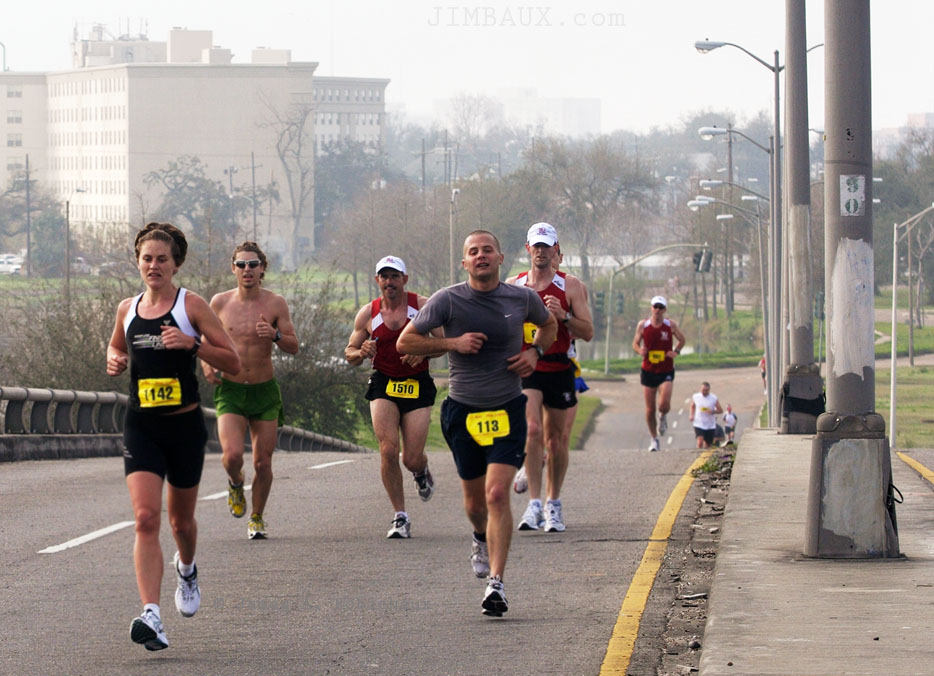


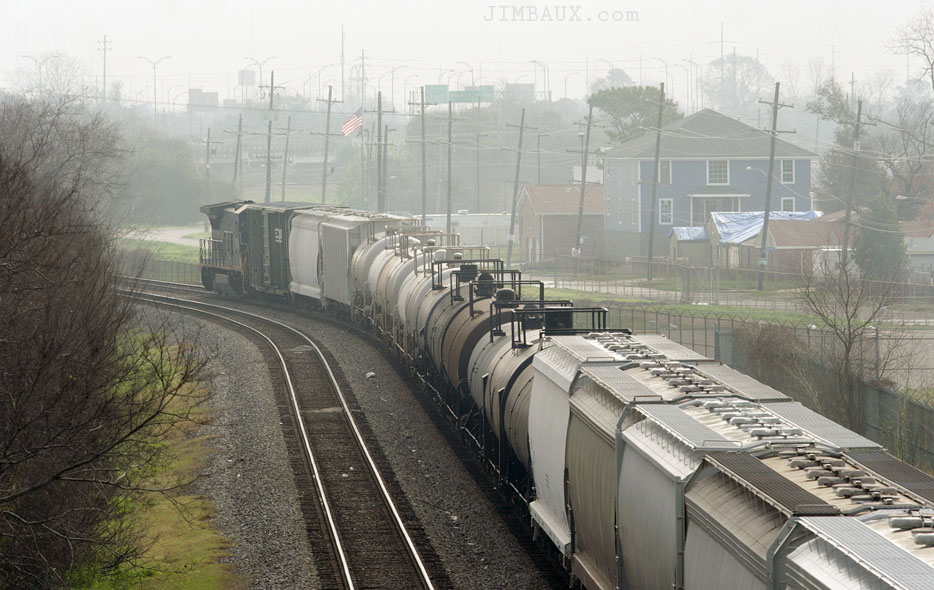
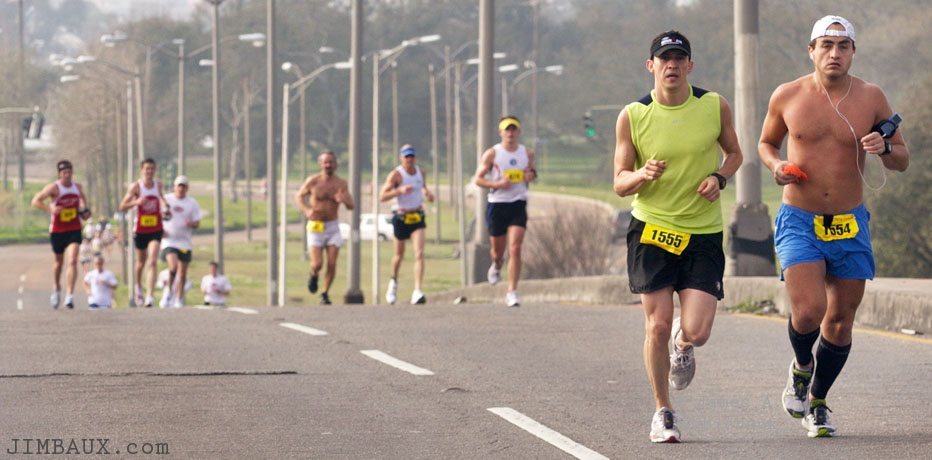
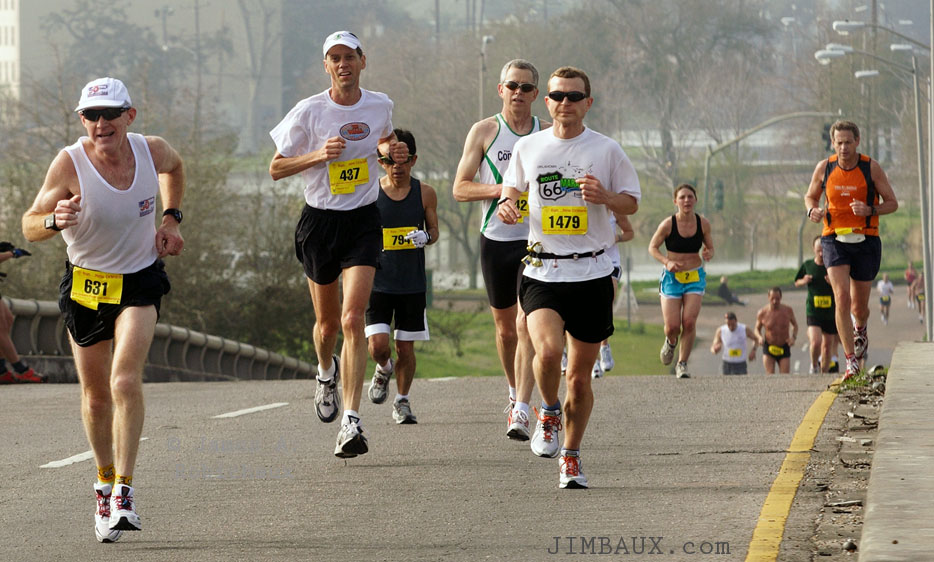
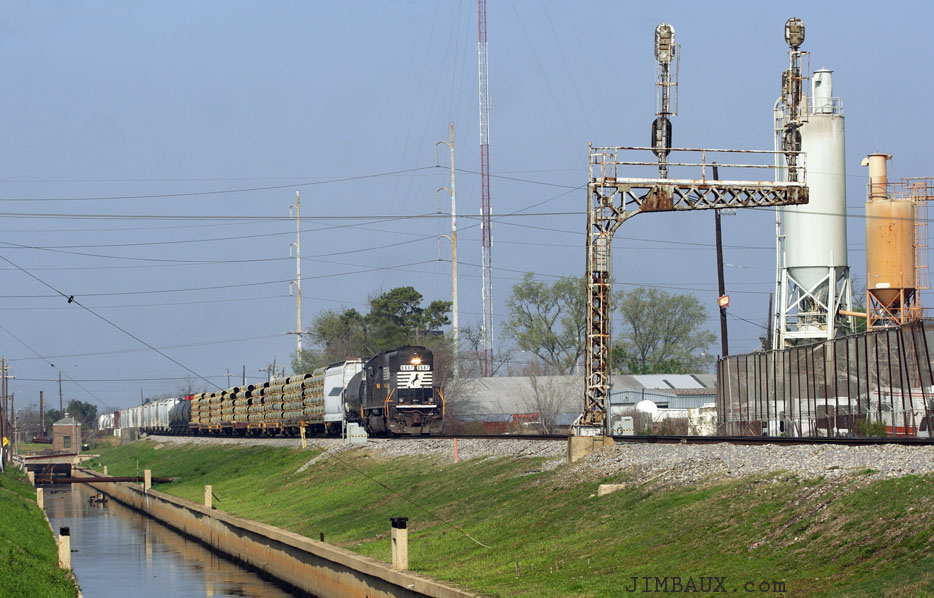
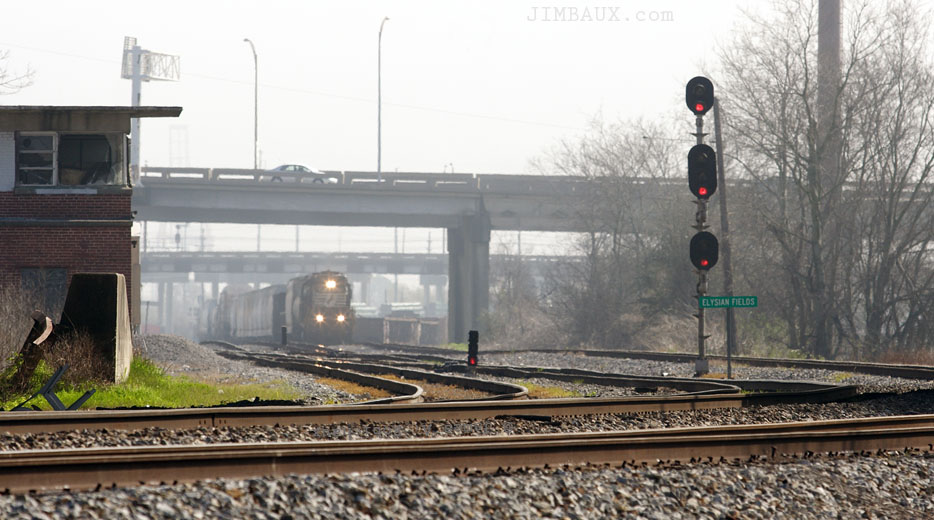
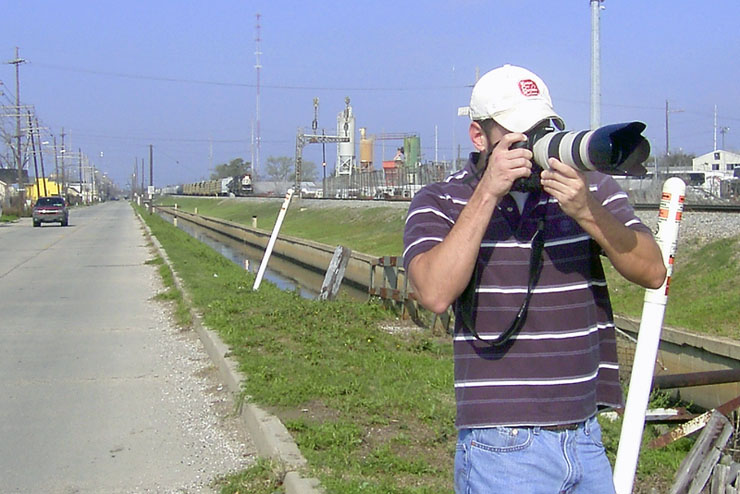
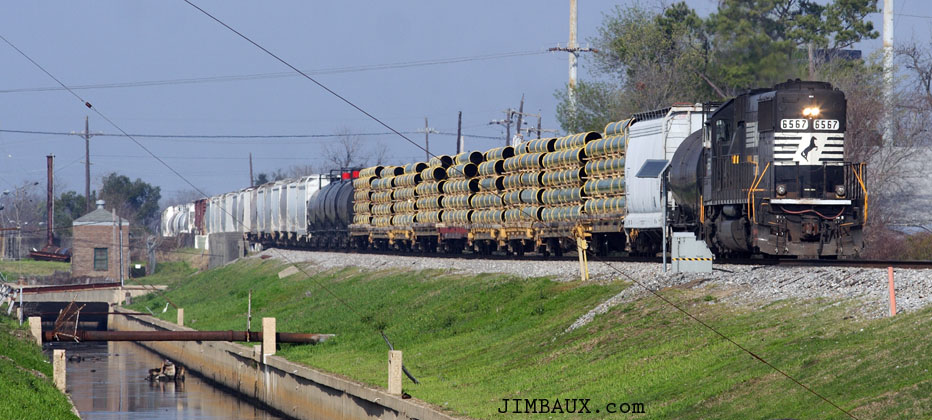
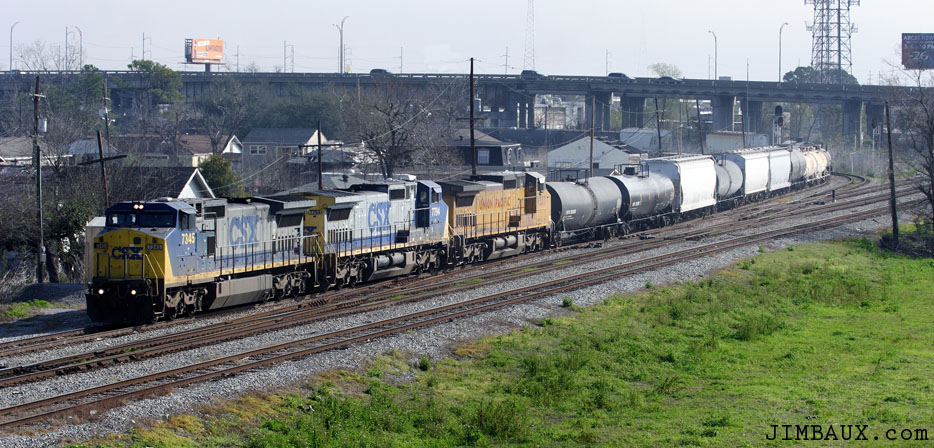

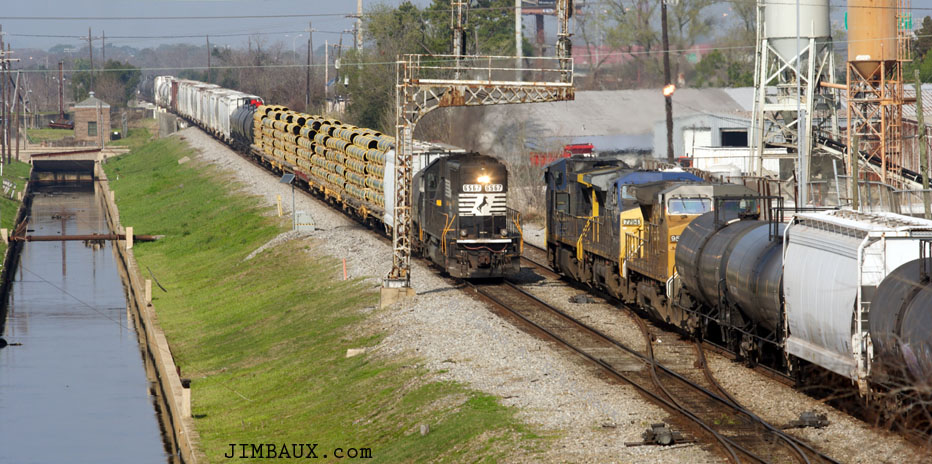
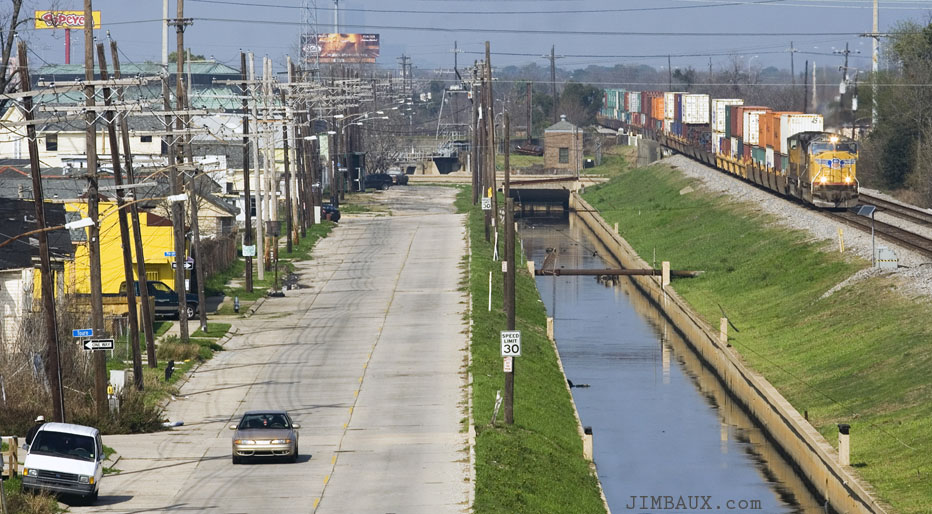

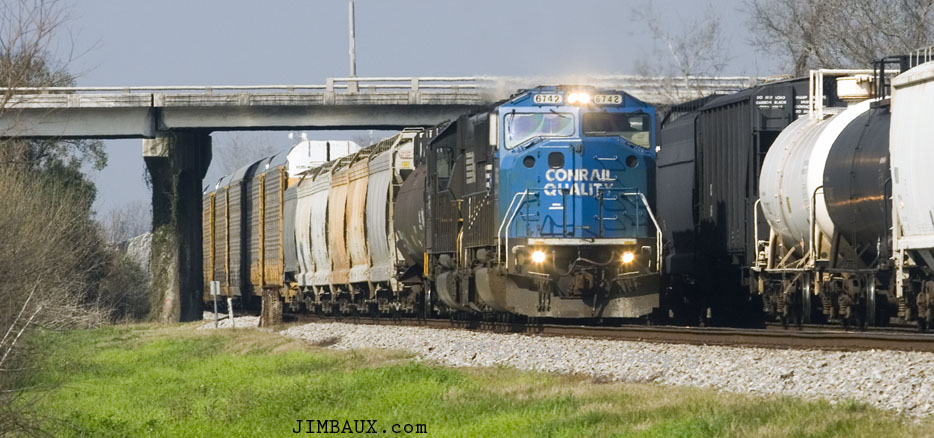
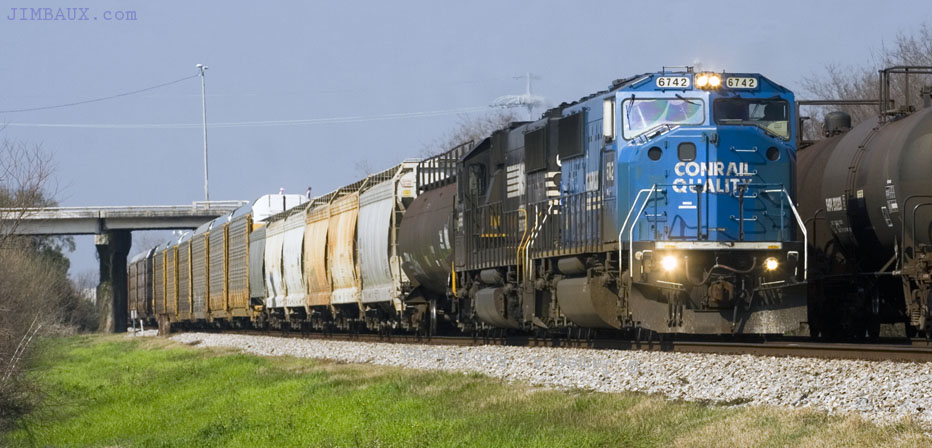

{ 2 comments… read them below or add one }
Just because the shots are ” the some ole same ole ” doesn’t mean they are really the same , I highly doubt that its the same engines or cars being pulled , nor is it the same focus in these shots , I read to get inside the mind of you , to understand you and trains , how you work . Yes I have “nitro pics ” on facebook. But I do things differently than you cause you are you and I am me . That’s what makes this world go around . I also do like other thong you take pictures of , whether its of a copper studio or loggers in the morning , it all inspires me to pick up myself and my camera. I’m gonna get to a very small yard in your ” backyard” when movements are going on if you would be so kind to come out , Deacon Nitro
I’ve been scanning a lot of older stuff and putting it on RRPA lately. What I discover is that you will find that after 1 year, 3 years, 5 years, there are minor changes each time, but not always anything all that dramatic, though the larger gaps almost always find some notable differences. Like that CR unit…..I have to laugh when I see something like that, in light of the NS heritage program. There was a true “heritage” unit!! And now they are nearly all gone, what were once common. Most of what I’ve been working with lately is in the 10 year range, and I’m amazed at the CP consists I shot that are all SD40-2’s, sometimes six to a train, and with some SOO power mixed in. Now almost every unit is a GE, and the SD’s and SOO units are much more sporadic. The pieces like this one do give you a sense of historical perspective. Sometimes it’s eye opening.